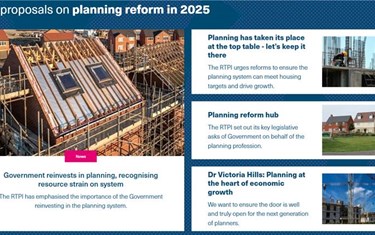Timothy Crawshaw MRTPI is an International Planning and Development Consultant. He is currently the RTPI’s Vice-President and will become President in 2022.
A wild and windy Brighton provided the setting for the Labour Party Conference 2021, which featured an inspiring range of discussions and debate with politicians, their advisors, and the private and third sectors.
The challenges of the climate emergency alongside a clear desire to bring our communities together as we recover from the pandemic were common and urgent themes. While not everyone would agree with the methods to get there, it is hard to argue with the statement from Lucy Powell MP that the bedrock of a successful, happy life is a ‘safe, secure, stable, warm, truly affordable home’.

Image: Tim meets Shadow Secretary of State for Housing Lucy Powell
It has been no secret in my professional life that I have been concerned about the scourge of poor-quality buy-to-lets being the norm in the areas where traditionally people had found their first foot on the housing ladder, and, in doing so, incrementally and enthusiastically maintaining and improving the housing stock without large scale intervention.
But times have changed, market forces have driven up prices for both renters and buyers, there are a frightening number of people living in precarious circumstances one setback away from a crisis, and the yawning gaps and inequalities in our society are widening at an alarming rate. The jaws of destitution, the threat of climate change and systemic cuts in support and benefits are being played out starkly in our towns and cities.
Entrepreneurial approach
At the conference, I was inspired to meet leaders who are building social and intermediate housing directly and through housing corporations, flexing the powers of local government sometimes to the limit, innovating and displaying an entrepreneurial approach that makes traditional development economics seem somewhat pedestrian.

Image: Tim was delighted to chat with Cllr Darren Rodwell, leader of Barking & Dagenham Council
A takeaway for me was this; even though the planning system has its frustrations, and the grey areas of a discretionary system were all too evident, few can point the finger at housing supply and planning permissions as the barrier to solving the housing crisis. Perhaps it is resources, funding and the status of planning professionals which could be looked at first…
Community engagement
A common theme from the many high-profile speakers at roundtables and events was the need to engage communities to co-design the solutions to the challenges we face in our towns and cities.
There was also a call from some to consult those who have not benefitted from home ownership, or any form of secure rent, when new development is proposed. Perhaps the voices we often hear are not representative of the society that planning seeks to serve.
Existing communities in the 'left behind' places were also a common theme and the neighbourhoods they live in are all too often where the most work needs to be done. I have called in many forums for a programme of deep retrofitting that not only treats the buildings to save energy, an essential response to the climate emergency, but that also brings together placemaking, health and wellbeing, biodiversity and sustainable drainage. I was heartened to find that some of this thinking was beginning to take root, and pilots are beginning to happen.
Power of planning
If we are to tackle the climate, wellbeing and biodiversity crises we need planners at the centre of the process. No other group of professionals can bring the depth and breadth of knowledge to heal our places and communities and build a better future.
I am reminded that the RTPI recently called for a £500 million injection into the planning system to meet the government’s objectives around beauty, housing and the climate. Given the scale of the challenges, the power of planning in partnership with communities, and recognising the importance of place to everyone, I think this may just be the starter for ten.
Planners traditionally are at the heart of the curation of place, the deliverers of stacked benefits for society, and the translators of community aspirations for a better world. This week at the Labour Party Conference I saw some hope.


